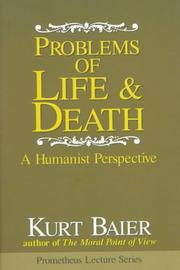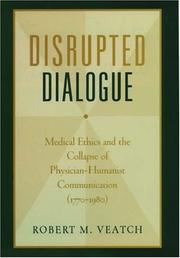| Listing 1 - 4 of 4 |
Sort by
|

ISBN: 157392153X Year: 1997 Publisher: New York Prometheus Books
Abstract | Keywords | Export | Availability | Bookmark
 Loading...
Loading...Choose an application
- Reference Manager
- EndNote
- RefWorks (Direct export to RefWorks)
In Problems of Life & Death: A Humanist Perspective, he offers a lively discussion of humanism and supernaturalism; problems of practical wisdom featuring death and the good; and traditional moral problems. Part one traces contemporary rational humanism to its roots in ancient Greece; its revival in the Christian renaissance; its development during the scientific revolution, the 18th century Enlightenment, the Darwinian theory of evolution, and its contemporary developments. Part two answers broad questions of practical wisdom from the rationalist point of view. The third part offers a rationalist conception of morality to replace "the will of God" as the impetus for human action. Baier then applies this moral stance to a number of contemporary moral problems including how to lead a rewarding life, homosexual behavior, birth control, and suicide. With fresh ideas, a carefully argued thesis, and convincing conclusions, Baier shows how the rational humanist can come to grips with some of the deepest problems of human existence, without assumptions based on religious faith. What gives purpose to our existence? What happens to our mind and body when we die? What invests our lives with meaning and propels us to go on from day to day? These are some of the questions that have occupied humankind fo centuries. Do solutions to these problems of life and death depend, as many believe, on the existence and intervention of a supernatural creator god? In this contribution to the Prometheus Lecture Series, noted philisopher and humanist Kurt Baier, one of the leading ethical theorists of the 20th century, contends that rational humanism is the best alternative to theism.

ISBN: 2702131018 Year: 2000 Publisher: Paris Calmann-Levy
Abstract | Keywords | Export | Availability | Bookmark
 Loading...
Loading...Choose an application
- Reference Manager
- EndNote
- RefWorks (Direct export to RefWorks)
Genetics --- Humanistic ethics. --- Research --- Moral and ethical aspects. --- Humanistic ethics --- biogeneeskunde --- biomedische technologie --- biopolitiek --- ethiek (ethische aspecten) --- gezondheidszorgbeleid (gezondheidszorghervorming, gezondheidszorgsysteem) --- medische praktijk --- sociaal-politieke aspecten --- volksgezondheid --- waardendebat (waardenverheldering) --- Humanist ethics --- Ethics --- Humanism --- Biology --- Embryology --- Mendel's law --- Adaptation (Biology) --- Breeding --- Chromosomes --- Heredity --- Mutation (Biology) --- Variation (Biology) --- Research&delete& --- Moral and ethical aspects --- biomédecine --- technologie biomédicale --- biopolitique --- ethique (aspects ethiques) --- politique des soins de santé (réforme des soins de santé, système des soins de santé) --- pratique médicale --- aspects socio-politiques --- santé publique --- débat sur les valeurs (clarification des valeurs)

ISBN: 1280840978 0199748101 1429438169 9781429438162 9781280840975 9786610840977 6610840970 019516976X 9780195169768 0197706371 9780199748105 Year: 2005 Publisher: Oxford Oxford university press
Abstract | Keywords | Export | Availability | Bookmark
 Loading...
Loading...Choose an application
- Reference Manager
- EndNote
- RefWorks (Direct export to RefWorks)
Medical ethics changed dramatically in the past 30 years because physicians and humanists actively engaged each other in discussions that sometimes led to confrontation and controversy, but usually have improved the quality of medical decision-making. Before then medical ethics had been isolated for almost two centuries from the larger philosophical, social, and religious controversies of the time. There was, however, an earlier period where leaders in medicine and in the humanities worked closely together and both fields were richer for it. This volume begins with the 18th century Scottish Enlightenment when professors of medicine such as John Gregory, Edward Percival, and the American, Benjamin Rush, were close friends of philosophers like David Hume, Adam Smith, and Thomas Reid. They continually exchanged views on matters of ethics with each other in print, at meetings of elite intellectual groups, and at the dinner table. Then something happened, physicians and humanists quit talking with each other. In searching for the causes of the collapse, this book identifies shifts in the social class of physicians, developments in medical science, and changes in the patterns of medical education. Only in the past three decades has the dialogue resumed as physicians turned to humanists for help just when humanists wanted their work to be relevant to real-life social problems. Again, the book asks why, finding answers in the shift from acute to chronic disease as the dominant pattern of illness, the social rights revolution of the 1960's, and the increasing dissonance between physician ethics and ethics outside medicine. The book tells the critical story of how the breakdown in communication between physicians and humanists occurred and how it was repaired when new developments in medicine together with a social revolution forced the leaders of these two fields to resume their dialogue.
Medical ethics --- Humanistic ethics --- Physicians --- Humanist ethics --- Ethics --- Humanism --- Allopathic doctors --- Doctors --- Doctors of medicine --- MDs (Physicians) --- Medical doctors --- Medical profession --- Medical personnel --- Medicine --- Biomedical ethics --- Clinical ethics --- Ethics, Medical --- Health care ethics --- Medical care --- Bioethics --- Professional ethics --- Nursing ethics --- Social medicine --- History. --- Moral and ethical aspects --- History
Book
Abstract | Keywords | Export | Availability | Bookmark
 Loading...
Loading...Choose an application
- Reference Manager
- EndNote
- RefWorks (Direct export to RefWorks)
Humanistic ethics --- Human rights --- Philosophical anthropology --- Genetics --- Moral and ethical aspects --- Population humaine --- human population --- Biotechnologie --- Biotechnology --- Génie génétique --- genetic engineering --- Environnement socioculturel --- sociocultural environment --- Ethics --- -Human rights --- 165.74 --- biomedische technologie --- mensbeeld --- menselijke natuur --- antropologie (culturele antropologie, antropologische aspecten) --- antropocentrisme --- humanisme --- transhumanisme (cyborg) --- verbetergeneeskunde (mensverbetering) --- determinisme --- genetica (genen) --- ethiek (ethische aspecten) --- geschiedenis (historische aspecten) --- filosofie (filosofische aspecten) --- Anthropology, Philosophical --- Man (Philosophy) --- Civilization --- Life --- Ontology --- Humanism --- Persons --- Philosophy of mind --- Humanist ethics --- Basic rights --- Civil rights (International law) --- Rights, Human --- Rights of man --- Human security --- Transitional justice --- Truth commissions --- Biology --- Embryology --- Mendel's law --- Adaptation (Biology) --- Breeding --- Chromosomes --- Heredity --- Mutation (Biology) --- Variation (Biology) --- technologie biomédicale --- image de l'homme --- nature humaine --- anthropologie (anthropologie culturelle, aspects anthropologiques) --- anthropocentrisme --- transhumanisme --- médecine de l'amélioration (médecine d'amélioration) --- déterminisme --- génétique (gènes) --- ethique (aspects ethiques) --- histoire (aspects historiques) --- philosophie (aspects philosophiques) --- Philosophy --- Law and legislation --- Human rights. --- Humanistic ethics. --- Philosophical anthropology. --- Moral and ethical aspects. --- Genetics - Moral and ethical aspects
| Listing 1 - 4 of 4 |
Sort by
|

 Search
Search Feedback
Feedback About UniCat
About UniCat  Help
Help News
News